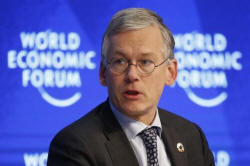|
 Philips
CEO: uptake of connected care products progressing
slowly Philips
CEO: uptake of connected care products progressing
slowly
 Send a link to a friend
Send a link to a friend
[May 18, 2017] By
Bart Meijer
AMSTERDAM (Reuters) - The adoption of
connected technologies in healthcare remains limited and is progressing
slowly, despite the promise they hold for cutting medical costs by
preventing illness, the chief executive of Philips said on Wednesday.
|
|
 The conclusion is one of several derived from a major survey the
company is publishing this week, but the question is not academic
for Philips: it has staked its future on the healthcare market after
spinning off its lighting operations last year, and it expects
connected care to be one of the major pillars of its future growth. The conclusion is one of several derived from a major survey the
company is publishing this week, but the question is not academic
for Philips: it has staked its future on the healthcare market after
spinning off its lighting operations last year, and it expects
connected care to be one of the major pillars of its future growth.
Connected care includes live electronic communication between
patients and doctors and remote patient monitoring.
"Healthcare is a conservative marketplace," CEO Frans van Houten
told Reuters in a phone interview. "In the finance world people
adopted the internet twenty years ago, in healthcare that is (just)
happening now. ”
Philips, which generated 17.4 billion euros ($19.4 billion)in sales
from its healthcare operations in 2016, expects rising life
expectancy and associated chronic diseases to lead to growing demand
for devices that allow patients to stay at home while their data is
remotely monitored by doctors and carers.

Comparable sales growth of Philips' own connected care businesses
slowed to 1 per cent in the first quarter of this year. However, Van
Houten said he remains optimistic about prospects for the division.
"The second quarter will be better", he predicted. "I remain
convinced of the compelling case for connected care."
He said one major obstacle for the adoption of connected devices and
platforms is the design of most insurance systems.
"Insurers reimburse critical care, not the avoidance of incidents.
Therefore investments are not targeted towards prevention."
[to top of second column] |

Patients themselves are usually eager to adopt new technology, he
said.
"Concerns about the possible side-effects of connected care are
swept aside by the expectations of the benefits when people are
confronted with a chronic disease themselves," he said.
"Resistance that could be privacy-related completely disappears."
Philips' survey, which looks at health systems in 19 countries
around the world, is to be published Thursday.
($1 = 0.8965 euros)
(Reporting by Bart Meijer; Editing by Toby Sterling and Toby Chopra)
[© 2017 Thomson Reuters. All rights
reserved.] Copyright 2017 Reuters. All rights reserved. This material may not be published,
broadcast, rewritten or redistributed.
 |